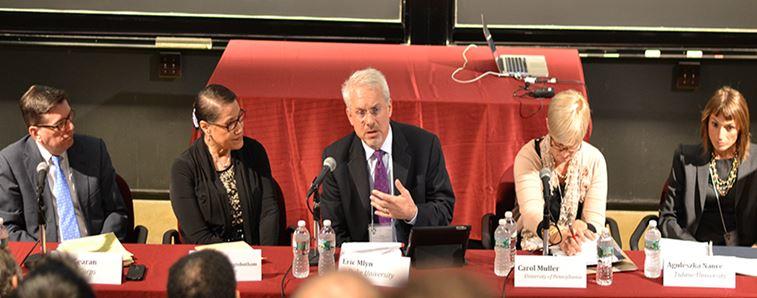
How can Harvard more fully integrate what students learn through community service with what they study in the classroom? Six national experts on civic engagement and service learning discussed how and shared best practices to a packed room at the panel discussion “The Intersection of Public Service with Teaching, Learning, and Research at Harvard,” held on October 10 in the Science Center.
The panel was moderated by Michael D. Smith, Edgerley Family Dean of the Faculty of Arts and Sciences. “At Harvard, we are rethinking higher education and how students are learning in and outside of the classroom,” he said. “Public service is a very important part of this thinking.”
There has always been a strong grassroots interest in civic engagement on campus, said Robert Lue, Richard L. Menschel Faculty Director of the Derek Bok Center for Teaching and Learning and professor of the practice of molecular and cellular biology. According to Lue, the Bok Center is working with faculty to bring civic engagement into the curriculum, which now features 15 new courses that include a public service component.
Panelists from Harvard, Duke University, Hobart and William Smith Colleges, Tulane University, and the University of Pennsylvania shared examples of service learning on their campuses and their passion for its impact.
“How can we not bring the resources of our great institutions on the most important local, national, and international problems?” says Eric Mlyn, assistant vice provost for civic engagement at Duke and Peter Lange Executive Director of DukeEngage, which provides one-time funding for Duke undergraduates who wish to pursue an immersive service experience.
“As an alumnus and parent, I’m very excited to be a part of this discussion,” said Mark Gearan ’78, P’15, president of Hobart and William Smith Colleges, co-chair of the National Advisory Board for Public Service at Harvard College, and former director of the Peace Corps. “What Harvard does, or does not do, in this space is consequential.”
“More than half of Harvard students are civically engaged, but we need to find even more opportunities to integrate it with the curriculum,” said James Kloppenberg, Charles Warren Professor of American History and a member of the FAS Standing Committee on Public Service. “We can imagine something in which a student involved in a community service program in Chinatown pairs this experience with a course on the anthropology of immigrant communities.”
A curriculum that combines academic study with on-the-ground learning promotes student engagement and infuses theory with real knowledge, said Evelyn Brooks Higginbotham, Victor S. Thomas Professor of History and of African and African American Studies. “It is highly collaborative and interdisciplinary work,” she said.
Community service is one way that students can bring their own knowledge to academic discussions, said Carol Muller, Moorman Simon Fellow in Civic Engagement at the Netter Center for Community Partnerships, director of the African Studies Center, and professor of music at the University of Pennsylvania. “It is also a wonderful way to show students what research in a community is really about,” she said.
When community service is integrated into the curriculum, it can change the culture of the institution, impact admissions and retention, and “help students feel like they’ve found their place,” noted Agnieszka Nance, interim executive director of the Center for Public Service and professor of Germanic studies at Tulane University.
Responding to audience questions about how institutes measure the success of programs and assess learning outcomes, panelists brought up the need for more faculty incentives and research on the collective impact of this kind of student engagement.
Other speakers included Mary Waters, M. E. Zukerman Professor of Sociology and co-chair of the FAS Standing Committee on Public Service, and Cheryl Dorsey ’85, MD ’92, MPP ’92, president of Echoing Green and co-chair of the National Advisory Board for Public Service at Harvard College.
At the conclusion of the symposium, Waters encouraged the audience to keep the conversation going and to share ideas with members of the committee.
Organized by the FAS Standing Committee on Public Service with support from Assistant Dean for Public Service Gene Corbin, the panel was cosponsored by the Bok Center, Harvard Initiative for Learning and Teaching (HILT), Office of Undergraduate Education, Phillips Brooks House, and Harvard Alumni Association as part of its Harvard Serves initiative.
Written by the Harvard Alumni Association about "The Intersection of Public Service with Teaching, Learning, and Research Symposium" at Harvard.
